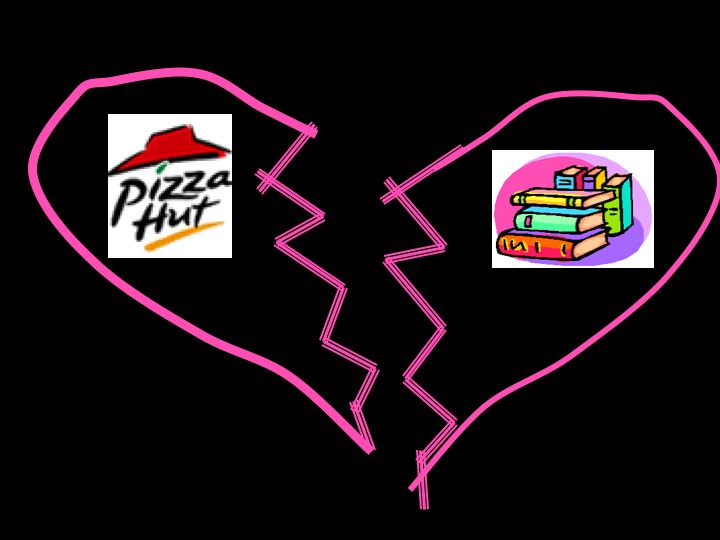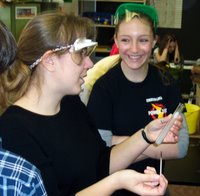Media Literacy - in the curriculum?
Andy Carvin (author of a recent post on learning.now) relates a discussion he had with Dan Rather regarding media literacy. He concludes his post by commenting,
My curriculum is already full of topics I should teach. It is a constant exercise in prioritization to decide what I can cover in a relatively short time. However, I think media literacy is vital and I want to work to make it a priority in my classroom. It is no longer necessary for kids too memorize the lists scientific facts I recall being relentlessly quizzed over as a student. Students today can access any information they need in a fraction of a second on the Internet. The question is, do they know what to do with it?
Too often, I see teachers who assign "research projects," leaving the kids to their own devices on the Internet. Most teachers teach how to cite sources, but few spend time discussing image usage and web site evaluation. Alternately, many teachers limit student searches to a few reputable teacher-chosen sites. Many warn their kids against using Wikipedia. One of my co-workers even forbids students to search on Google.
However, this strict control does not prepare our students to use the Internet as a tool. As Andy Carvin states, "...every kid in America with a camera phone and access to YouTube" contributes to the massive amounts of media available to them. And they obviously are using this media when there are not teachers around to "control" them.
I've run across a few tools to teach responsible media usage. A Madison, WI site includes an evaluation checklist and example sites to investigate. UC Berkeley and Cornell University are just two of the colleges that have suggestions of how to evaluate websites. One interactive kid-friendly site, Jo Fool or J Cool, allows kids to visit mock-ups of web pages to determine whether they are legitimate sites or bad ideas. One of my goals for this year is to adapt these resources for use in my own classroom in order to improve the media literacy of my own students.
All this only addresses our students as consumers of media. As technology becomes more available and mainstream, I think schools will have a responsibility to guide students in the responsible production of media as well. Our kids' usage is far outpacing their expertise at this point. Schools can help close this gap.
Countless kids today are producing media, and they rarely get any guidance from schools. We don’t invest the time needed for today’s students to learn how to think critically about digital media, either through analyzing content or creating new content to understand the techniques that go into it.
Everyone now has the power to influence everyone - and teaching students to these technologies responsibly requires a serious commitment from educators. Are we prepared to commit?
My curriculum is already full of topics I should teach. It is a constant exercise in prioritization to decide what I can cover in a relatively short time. However, I think media literacy is vital and I want to work to make it a priority in my classroom. It is no longer necessary for kids too memorize the lists scientific facts I recall being relentlessly quizzed over as a student. Students today can access any information they need in a fraction of a second on the Internet. The question is, do they know what to do with it?
Too often, I see teachers who assign "research projects," leaving the kids to their own devices on the Internet. Most teachers teach how to cite sources, but few spend time discussing image usage and web site evaluation. Alternately, many teachers limit student searches to a few reputable teacher-chosen sites. Many warn their kids against using Wikipedia. One of my co-workers even forbids students to search on Google.
However, this strict control does not prepare our students to use the Internet as a tool. As Andy Carvin states, "...every kid in America with a camera phone and access to YouTube" contributes to the massive amounts of media available to them. And they obviously are using this media when there are not teachers around to "control" them.
I've run across a few tools to teach responsible media usage. A Madison, WI site includes an evaluation checklist and example sites to investigate. UC Berkeley and Cornell University are just two of the colleges that have suggestions of how to evaluate websites. One interactive kid-friendly site, Jo Fool or J Cool, allows kids to visit mock-ups of web pages to determine whether they are legitimate sites or bad ideas. One of my goals for this year is to adapt these resources for use in my own classroom in order to improve the media literacy of my own students.
All this only addresses our students as consumers of media. As technology becomes more available and mainstream, I think schools will have a responsibility to guide students in the responsible production of media as well. Our kids' usage is far outpacing their expertise at this point. Schools can help close this gap.
Labels: media literacy

